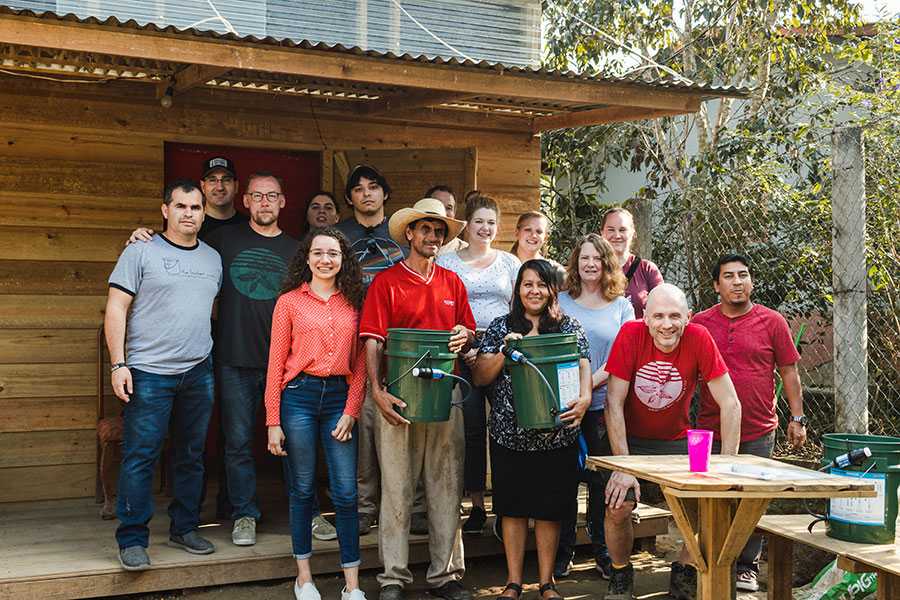COLUMBUS, Ohio, U.S. – Crimson Cup Coffee & Tea recently led owners and staff from three independent coffee houses to the Siguatepeque region of Honduras. While following coffee’s journey from seed to cup, they forged meaningful connections with coffee farmers, workers and processors.
“Coffee is more than a product; it’s a relationship,” said Coffee Buyer Dave Eldridge, who led the trip. “We all know what coffee means in our lives. Our origin trips are a way to share what coffee means in the lives of coffee growers and their communities.”
Founder and President Greg Ubert said trips like these support Crimson Cup’s goal of moving beyond the traditional coffee buying model. Many roasters use brokers to import coffee, never meeting the farmers and workers who produce the crop.
“We want to support coffee growers the same way we support coffee shop owners,” he said. “We succeed when they succeed.”
Crimson Cup funds in-country travel, meals and accommodations through its loyalty program, which allows coffee house owners to choose from a variety of rewards based on their annual purchases.
Coffee house owners and staff on the trip included Shawn and Lisa Peterson, owners of Moose Junction Coffee and Pizza in Helena, Montana; Baristas Kendra Eicher and Joanna Shetler from Jitter’s Coffee in Millersburg, Ohio; and Barista Shayanna Bleile from The Coffee House in Norwalk, Ohio. Chef Tristin Acevedo of the Culinary Vegetable Institute in Milan, Ohio also took part.
They were accompanied by a Crimson Cup team including Eldridge, 7 Steps Trainer Steve Bayless, Business Development Lead Bob Fahringer and Coffee House Manager Susan McMillan.
Bayless has trained coffee shop owners and staff for almost 12 years through Crimson Cup’s 7 Steps to Success coffee franchise alternative program.
“I was excited to see the impact we’re having at origin,” he said. “I also found there’s no substitute for the total sensory experience of being there – smelling and seeing and hearing coffee and interacting with the people who grow it.”
The team started their trip at Educafe, a school operated by ServeHope International. Crimson Cup partners with this local nonprofit to provide education, housing and clean water to workers and their families in Honduras and Guatemala.
The next day, they toured coffee farms to learn about coffee’s first few steps on the journey from seed to cup.
In the morning, they toured Finca Los Amigos near the village of El Socorro de las Penitas. Owned by community leader David Lopez, this well-manicured farm serves as a model for other area farmers.
Lopez and his workers talked about coffee growing, wet milling and coffee drying.
“My first big moment was when we walked down a steep decline into David’s fields,” Fahringer said. “We were surrounded by people picking coffee. Singing, having fun, throwing coffee cherries. It was joyful.”
Lopez built a wet mill on his farm several years ago that he shares at no cost with other area farmers. Processing their own coffee gives farmers greater control over costs and quality.
The team also saw a raised drying bed that Crimson Cup helped build on the farm. The raised bed helps coffee dry more evenly in the humid climate and prevents loss from mold and mildew.
Working with Lopez since 2011, Crimson Cup has purchased almost all of his crop the past few years. “It’s exciting to look around and know that we’re lifting up him and his workers,” Bayless said.
“Then he’s turning around and elevating his neighbors. We’re building that relationship chain link by link.”
After lunch, the team visited another local farm owned by a woman named Kenia. There, they held a coffee-picking competition, strapping on coffee-picking bags and heading out into the fields for 20 minutes.
“Bob, our fastest picker, picked three pounds of cherries,” Eldridge said. “He would have earned about $2 if he had continued at the same pace for another 7 hours and 40 minutes.”
The farm’s fastest picker, Danielle, brings in about 144 pounds of cherries per day. She earns about $10.
After leaving Kenia’s farm, the group played soccer with kids at META Sports Academy, then gathered for coffee, conversations and dinner.
The final day began with a tour of the dry mill at The Cooperativa Cafetalera Siguatepeque Limitada (COHORSIL). Dry milling is the final step of processing before bagging and exporting green coffee.
Afterward, they distributed coffee filter buckets to local families and taught them to use them. “Access to clean drinking water is a serious health issue – especially among families with children,” Eldridge said. “Each water filtration bucket can supply drinkable water to a family for years.”
Crimson Cup pays for the filters and partners with ServeHope to distribute them.
The trip ended with a discussion at ServeHope and a final dinner together. Participants agreed the experience had transformed the way they see coffee and the people who produce it.
Crimson Cup has been working with smallholder coffee farmers in the Siguatepeque region since 2011. Through its Friend2Farmer initiative, the roaster purchases coffee directly from farmers at an above-market premium. It also strives to make social, environmental, educational and economic impacts in farming communities.
“Connecting growers directly with coffee shop owners and baristas only strengthens our relationship chain,” Ubert said. “It’s awesome to see how these trips inspire our owners to get more involved with the coffee-growing world.”

















